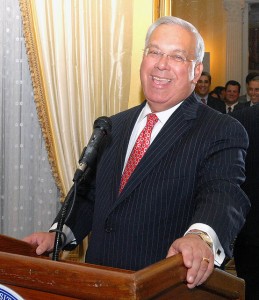By Ted McEnroe, The Community Roundtable
Few things in life are certain. But one of them is that Boston Mayor Thomas M. Menino, who died Thursday at the age of 71, would never have been an online community manager. The mayor, who served the city he loved for 20 years, was noted for, among other things, not even having a computer in his office, and for barring City Hall from using voicemail.

Boston Mayor Thomas M. Menino (Courtesy: City of Boston via Flickr)
But Tom Menino could teach today’s community managers a great many things about online community management. Here are five lessons from the Mayor:
The little things matter: Tom Menino described himself as an “urban mechanic” – someone who was interested in tinkering with the little things that make a city run, because those little things have a nagging tendency to become big things. Cleaning a street, mowing a median, fixing a pothole, repairing a broken window – these things are small. But they send a message that each neighborhood matters.
The same can be said about community – keeping up with the routine stuff, a lot of which might not even be visible to members – is at the heart of managing one well. We often refer to the “iceberg effect”, the 90 percent of what goes into running a best-in-class community that is unseen. When you take care of that 90 percent, it provides a foundation for the 10 percent on the surface – and better prepares you for the major snowstorms – the major planned and unplanned events that can make or break your community.
Personal contact has impact: Mayor Menino could pick up the phone and get a story in the papers at a moment’s notice. But he took the time every day to get out into the community and meet people face to face. A 2008 Boston Globe poll found more than half of Boston residents claimed they had met him in person as Mayor. Think that sounds crazy? A 2013 Globe poll asked the same question, and found 49% of its respondents had met Mayor Menino. You may not be able to visit all the members of your community – but the more closely and personally you connect, the stronger bond you create.
Technology is a tool – it should help, not hinder the work: Mayor Menino didn’t know technology, but he was a visionary in understanding the power that technology could have when applied to urban problems. He founded the “Office of New Urban Mechanics” to create innovative technology that empowered community members report and track problems, and more easily connect with City Hall.
But in other cases, as with voicemail, where he saw technology as a barrier to community – he shunned it.
Meet them where they are: It’s not just connecting with community members, but connecting with them on their issues, that matters. Rachel Happe often highlights that the best communities are built on shared value – the intersection of where your organization and your community can benefit from a community approach. Mayor Menino had a city to run – a multibillion-dollar operation. But he knew it couldn’t run well if he was out of step with community needs. So he visited, he listened and drove toward that shared value.
Own your imperfections: Tom Menino’s nickname was “Mumbles.” If that’s your calling card, you’re not coming into the job straight out of central casting.
Mayor Menino was legendary for his lack of eloquence – and he owned it and turned it into a positive. We all have flaws and foibles, and they shape who we are and how we manage. There is no one way to run a community – no matter how many of “Five Things…” posts you read. What’s does matter? Knowing your community, knowing yourself, and working accordingly.
It is striking that a man who led Boston into a new high-tech era was decidedly low tech himself. But in Tom Menino’s community, he noted in a 2010 speech on innovation, “At the heart of every interaction and innovation are people. People are what matter most.”
